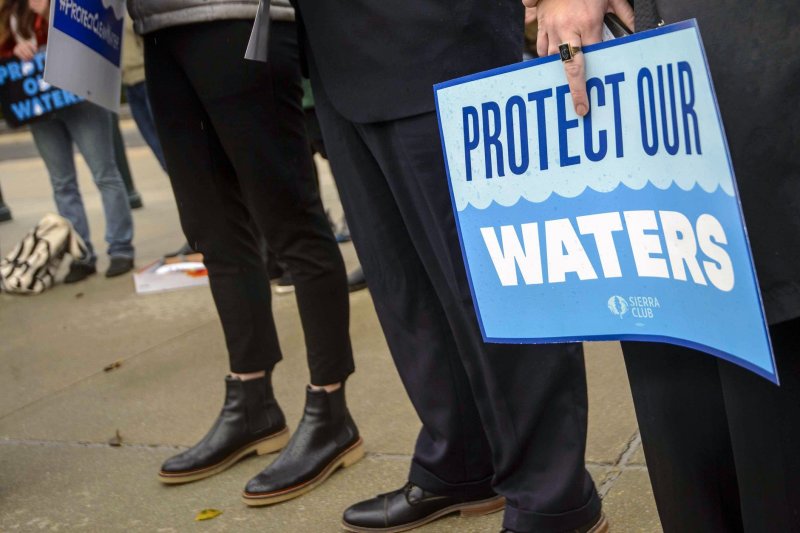1 of 5 | Activists stand in the rain outside the U.S. Supreme Court to support the Clean Water Act on the first day of their new term in Washington Monday. Photo by Bonnie Cash/UPI |
License Photo
Oct. 4 (UPI) -- The U.S. Supreme Court began its new term Monday by hearing a challenge to the Clean Water Act and whether certain environmental protections in the 1972 law might unfairly infringe on private land owners.
The stakes are high in the case, with about half of all wetlands in the United States, including 60% of streams, standing to lose federal protections if the mostly conservative court decides the government has overreached its authority.
"This case is going to be important for wetlands throughout the country, and we have to get it right," Justice Brett Kavanaugh said during the hearing that lasted nearly two hours, according to the Washington Post.
The case, which seeks to minimize federal wetland regulation, was brought by Michael and Chantell Sackett, who had previously won a federal legal battle to build their home near one of Idaho's largest lakes.
The Environmental Protection Agency told the couple that part of their 0.63-acre lot sat on federally protected land and could not be developed.
Facing a daily fine of $40,000, the Sacketts took the EPA to court in hopes of narrowing the scope of the Clean Water Act.
Last year, the 9th U.S. Circuit Court of Appeals in San Francisco ruled in favor of the federal government's finding that the area in question did constitute a wetland.
The Sacketts next appealed to the Supreme Court, which agreed in January to hear the case.
At Monday's opening arguments, justices wrestled with this question in an effort to define what constitutes "waters of the United States" as stated in the Clean Water Act.
Several conservative justices seemed bothered by the broad reach of the law, while the smaller liberal bloc appeared to want to maintain the government's authority to oversee various bodies of water, including lakes, wetlands and rivers.
Justices Neil Gorsuch and Samuel Alito were especially incredulous about the government's broad definition of wetlands, leading to a tense exchange with government attorney Brian Fletcher.
"How does any reasonable person know ... whether or not their land" is covered, Gorsuch asked, pressing Fletcher on the exact distance a development had to be from protected waters -- three miles or two miles -- in order to be subject to federal law.
Fletcher explained that the law implies limits instead of "bright-line rules."
Gorsuch then shot back: "So, if the federal government doesn't know, how is a person subject to criminal time in federal prison supposed to know?"
Monday's hearing was also the first for incoming Justice Kentanji Brown Jackson, who asked numerous questions and put the responsibility on the Sacketts, who obtained a permit 15 years ago to build a home about 300 feet from Priest Lake.
"Shouldn't they have gathered information about the property prior to purchasing?" she asked.
Previous rulings, including one that restricted the EPA's oversight of power plant emissions, indicate the conservative justices might lean toward the Idaho couple, who have received financial backing from conservative outlets across the country.
In April, the court voted 5-4 in favor of a Trump-era rule that prevented state and tribal governments from halting projects under provisions in the Clean Water Act.
The high court overturned a lower court's ruling striking down the rule. The four justices who dissented decried the majority's use of the so-called shadow docket to rule on the matter without more deliberation and explanation.
Under the 1972 Clean Water Act, state and tribal governments were allowed to issue or deny permits for projects that result in discharges into area waters.
A Trump administration rule issued in 2020, though, limited to what extent the governments could veto the projects, a win for industries frustrated by the process. The so-called certification rule allows governments to veto only projects that could impact water quality, not on any other grounds.















